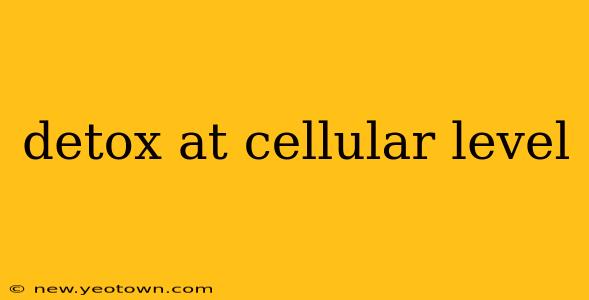We've all heard about detoxing – the idea of ridding our bodies of toxins and impurities. But what does that actually mean at a cellular level? It's not about some magical juice cleanse; it's about understanding and supporting the incredible, intricate processes your body already uses to cleanse itself. This isn't a quick fix, but a journey towards cellular health and vitality.
Imagine your cells as tiny, bustling cities. They're constantly producing energy, repairing damage, and removing waste. But just like any city, they can get congested with traffic (toxins) and need efficient waste management systems. This is where cellular detoxification comes in. It's a complex, multi-step process involving several vital systems within your body.
What are the Main Cellular Detoxification Pathways?
Our bodies possess several sophisticated mechanisms dedicated to cellular detoxification. These primarily involve the liver, kidneys, lymphatic system, and intestines.
The Liver: The Master Detoxifier
The liver is the unsung hero of cellular detoxification. Think of it as the central processing unit, constantly working to filter and neutralize toxins. It does this through a series of enzymatic reactions, breaking down harmful substances into less toxic forms that can be easily excreted. This includes processing everything from environmental pollutants to byproducts of metabolism.
Kidneys: The Filtration System
The kidneys act as a high-efficiency filtration system, removing waste products from the blood and eliminating them through urine. They play a crucial role in removing excess water, salts, and other metabolic byproducts that could otherwise accumulate and harm cells.
Lymphatic System: The Drainage Network
The lymphatic system is like a drainage network, collecting excess fluid and waste from the tissues and transporting it to the lymph nodes, where immune cells filter out harmful substances. A sluggish lymphatic system can hinder cellular detoxification, leading to a buildup of toxins.
Intestines: The Elimination Pathway
The intestines play a vital role in eliminating waste products from the digestive system. A healthy gut microbiome is essential for efficient waste removal, supporting overall cellular health. An unhealthy gut can contribute to the reabsorption of toxins back into the bloodstream.
How Can I Support Cellular Detoxification?
Now that we understand the intricate workings of cellular detoxification, let's explore how we can support these natural processes:
Hydration is Key: Water is essential for flushing out toxins. Aim to drink plenty of clean, filtered water throughout the day.
Nutrient-Rich Diet: A balanced diet rich in fruits, vegetables, and whole grains provides essential nutrients that support liver function and overall cellular health. Focus on foods rich in antioxidants, which combat cellular damage.
Prioritize Sleep: Sleep is when your body repairs and regenerates itself, including cellular detoxification processes. Aim for 7-9 hours of quality sleep each night.
Manage Stress: Chronic stress can disrupt cellular function and impair detoxification pathways. Practicing stress-reduction techniques like yoga, meditation, or spending time in nature can be beneficial.
Regular Exercise: Physical activity promotes circulation and lymphatic drainage, assisting in the removal of cellular waste.
Limit Exposure to Toxins: Reduce your exposure to environmental toxins by choosing natural cleaning products, avoiding smoking, and minimizing contact with harmful chemicals.
What are the signs of poor cellular detoxification?
Fatigue: Constant tiredness despite sufficient rest can indicate your body is struggling to eliminate waste effectively.
Bloating and Digestive Issues: These can signify a problem with the elimination of waste products from the digestive system.
Skin Problems: Skin issues like acne or rashes can sometimes reflect an inability to effectively eliminate toxins.
Headaches and Migraines: These can be caused by a buildup of toxins in the body.
Frequent Infections: A weakened immune system due to impaired detoxification can lead to increased susceptibility to infections.
What are some common misconceptions about cellular detoxification?
Misconception 1: Detox teas and pills magically cleanse your cells: While some herbal teas and supplements might support liver function, they don’t offer a quick fix for cellular detoxification.
Misconception 2: Fasting is the only way to detox: While intermittent fasting can have some health benefits, it's not the only or necessarily the best way to support cellular detoxification. A balanced lifestyle is key.
Cellular detoxification is a continuous process, not a one-time event. By focusing on lifestyle changes that support your body's natural cleansing mechanisms, you can contribute to a healthier, more vibrant you, at the cellular level. Remember, consistency is key – small, sustainable changes will have a profound impact over time.

